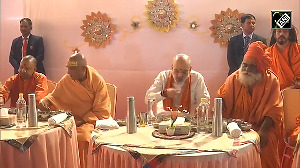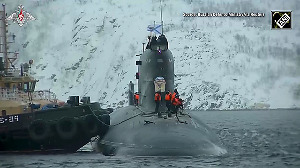Lieutenant Commanders Dilna K and Roopa A will remain at sea for 8 months.
They will rely on wind power, do the repairs on the boat themselves and navigate some the world's most treacherous waters.

At 11.30 am on Gandhi Jayanti, October 2, two women officers of the Indian Navy will set sail on an arduous journey around the globe on the second Navika Sagar Parikrama expedition.
It is just the sort of voyage sailors live and aspire for.
Lieutenant Commanders Dilna K and Roopa A have been preparing for the circumnavigation for the last three years.
They will set sail from Goa on the Indian Naval Sailing Vessel Tarini and remain onboard on the high seas for the next eight months -- just the two of them, their 17-metre sailboat and the Oceans.
About to set sail, the officers were busy preparing the boat on which they have spent most of their time in the past three years.
Talking to Rediff.com over a video call on Monday with the wind behind them as they held on to the ropes on their beloved boat, they were in the middle of loading up dry rations for the journey.
450 litres of water bottles; 700 litres in the boat's tank
Dal, rice, soft drinks, tea, coffee, dehydrated meals etc.
A LPG gas stove and heater will be used for cooking.
Since there is no refrigerator on board, fresh rations will be loaded today -- bread, butter, eggs, milk, onions, potatoes, garlic and some vegetables like capsicum, lady's finger that will last them for the next 5 days, perhaps till the time they leave Indian waters around Cape Comorin towards Sri Lanka and enter the Indian Ocean.

The duo will harness wind power to navigate some of the world's most dangerous waters across three oceans -- Indian, Pacific, Atlantic; three great capes -- Cape Leeuwin (New Zealand) Cape Horn (South America), Cape of Good Hope (South Africa), the Equator twice and will pass just 500-600 miles shy of Antartica.
They will have four stops -- Fremantle, Leeuwin, Falklands and Cape Town. The stops will be used for conducting repairs of the boat which would have sustained considerable lashing at sea, and also to replenish supplies.
They are also carrying 100 empty bottles to collect water samples for the National Institute of Oceanography, and will document marine mammal sightings for the Wildlife Institute of India.
The officers will sail around 21,000 nautical miles, 40,100 kms on wind power alone without much external assistance apart from weather reports from the Indian Navy to help them plan their passage.
Commander Abhilash Tomy, Kirti Chakra and India's greatest sailing hero, has been their mentor and coach for the expedition.

"We are both very excited and have got immense support. The Navy and our parents are all here to see us off," says Lieutenant Commander Dilna who joined the navy 10 years ago as a logistics officer. A native of Kozhikode, her father served in the Indian Army.
She is also a national level shooter and was a state under-19 cricket player.
Lieutenant Commander Roopa is the daughter of an IAF officer. Hailing from Pondicherry, she always dreamed of joining the armed forces and was commissioned in the navy in 2017. She is also a marathon runner.
"The difficult part of the journey will be around the southern ocean because there's no landmass to obstruct the wind or the current," says Lieutenant Commander Roopa.
"We have planned the entire circumnavigation to cross Cape Horn at a particular time during the Austral summer in the southern hemisphere."
"Even when it is summer in the Pacific, the temperature is below two degrees. There are hailstorms and snowfall. Entering that part will be tough and it will be the longest leg of the journey - about 45 days."

Most of the clothing they will carry are winter jackets and storm wear for the cold, icy, winds and the rain.
During the journey, the officers will conduct maintenance of equipment and repairs themselves. The boat is equipped with a 130hp Volvo penta engine, 1 kg solar panel and wind generator.
The engine will only be used to enter the harbour and in case of emergency.
"A distress signal is sent out when the safety of the crew and the boat is in danger. We have certain emergency equipment on board and can press the distress button which will alert the rescue stations nearby," explains Lieutenant Commander Roopa.

Both the officers have an impressing sailing experience between them and have been on expeditions to Rio de Janeiro, Mauritius and Port Blair in the past.
"Our daily routine during this circumnavigation will depend on the sea state -- whether it is calm or rough, but certain activities are done irrespective of the weather. We have to send a situation report twice a day to the navy," says Lieutenant Commander Dilna.
"Sailing is very physically challenging. So the circumnavigation, starting from day one will be physically demanding."
"For mental fitness, we do meditation practices which actually give better results when you are one with nature at sea," she says.

Among the personal belongings they have packed are family photographs, music and holy idols.
They are also carrying books, music, journals to write about the experience and cell phones for the four ports they will disembark at for around 10 days each.
They will be met by Indian defence attaches at the ports and two personnel from the Indian Navy who will fly to the location to provide assistance.
One of the places along the way that the officers are most looking forward to are the Falkland Islands, one of the remotest places on the globe.
If they are lucky they could get to witness the Aurora Australis in Tasmania.
In the Northern Hemisphere, the phenomenon is called the northern lights (Aurora Borealis), while in the Southern Hemisphere, it's called the southern lights (Aurora Australis).
"A full moon night, the reflection of the stars and moon in the ocean and the sound of the waves is really beautiful," says Lieutenant Commander Dilna.

Selected from a group of 17 women naval officers who participated in a race from Kochi to Goa to be eligible for the Indian Navy's second Navika Sagar Parikrama, Lieutenant Commanders Dilna and Roopa are the first Indian two-women team of sailors to attempt the circumnavigation.
When they set sail on Gandhi Jayanti, they go with the nation's good wishes for success.
God Speed, ride the waves to glory and return victorious!
WATCH: Commander Abhilash Tomy, KC, wishes Lieutenant Commanders Dilna and Roopa fair winds as they embark on a historical voyage across the oceans, undaunted.
Feature Presentation: Aslam Hunani/Rediff.com












 © 2025
© 2025